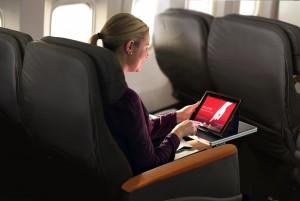AviationLawmakers want FAA to allow use of electronic gadgets during flights
Lawmakers have questioned whether personal electronic devices interfere with the electrical equipment of an airliner’s cockpit, and they want the Federal Aviation Administration (FAA) to allow more such gadgets on planes.

Lawmakers seek to make electronic use allowable on airline flights // Source: e-tel.com.tw
Lawmakers have questioned whether personal electronic devices interfere with the electrical equipment of an airliner’s cockpit, and they want the Federal Aviation Administration (FAA) to allow more such gadgets on planes.
USA Today reports that Senator Claire McCaskill (D-Missouri) has told FAA administrator Michael Huerta there is no risk from personal electronic devices, which are typically restricted near takeoffs and landings, because passengers use their devices on general-aviation planes regularly.
McCaskill went further, rejecting the idea that electronics are a distraction from safety lectures at the start of flights, because flight attendants do not insist that passengers put down their copies of War and Peace.
“I feel very strongly that this is an example of a rule that needs to go away,” McCaskill told USA Today.
Senator John Thune (R-South Dakota) is teaming up with McCaskill to put an end to the rules.
“It seems like these are rules for rules’ sake that sometimes go beyond what is even practical, let alone what is safe,” said.
Devices such as Kindles, iPads, and conventional laptops are not allowed to be used when a plane is less than 10,000 feet in the air. Now, the FAA advisory committee is studying whether allowing electronics is a good idea and Huerta said the study “is of great personal interest to me.”
Cellphones are prohibited as well, but the Federal Communications Commission bans them, not the FAA.
According to Huerta, flight crews and electronics makers are also involved in the study, and a recommendation could come as soon as July. One issue, however, could be how crew members would tell the difference between a restricted phone and other electronic devices when a plane is taking off or landing.
“The worst of all worlds for them would be if we made some determination that certain devices were OK while others are not because it becomes an extremely difficult thing for them to enforce,” Huerta told USA Today.
McCaskill wants the use of electronic devices expanded by the end of the year, and, if they are not, a written explanation as to why. McCaskill also asked Huerta why personal electronics are allowed on Air Force One, but not on normal flights.
“If it’s safe enough for the president of the United States, it’s safe enough for the flying public,” McCaskill said.
